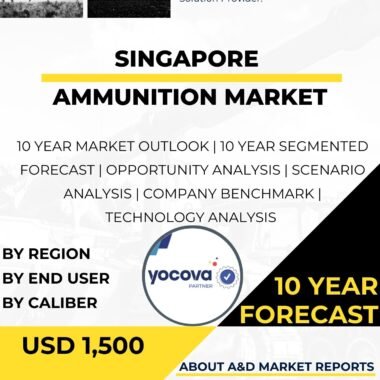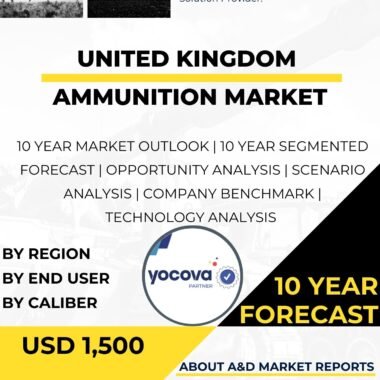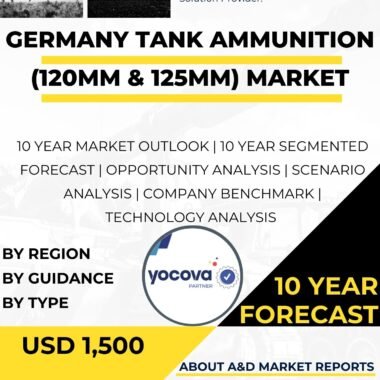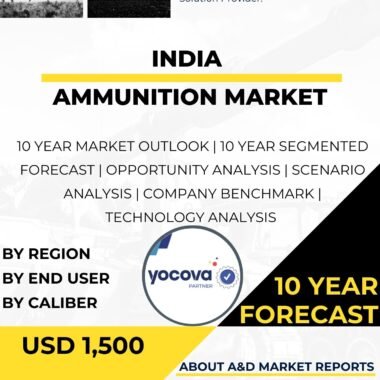Description
France Ammunition Market Overview
The France Ammunition Market represents a core pillar of the country’s defense and security ecosystem. It supports the operational readiness of the French armed forces across land, air, and naval platforms. France has developed a strong industrial base capable of producing a wide range of ammunition types. This capability ensures self-reliance during both peacetime and conflict situations. The market also benefits from long-term government planning and defense budgets. In addition, France’s ammunition sector plays an important role in supporting allied nations. Export activities further strengthen industrial sustainability. Overall, the market reflects France’s strategic emphasis on defense preparedness and technological strength.
Strategic Importance of the Ammunition Market
The strategic importance of France’s ammunition market lies in its direct connection to national security and military effectiveness. Ammunition is a fundamental requirement for training, deterrence, and combat missions. Without a reliable supply, even advanced weapon systems lose effectiveness. France ensures continuous availability to maintain force readiness. High-quality ammunition improves accuracy, safety, and battlefield performance. The market also supports rapid response during crises. Additionally, ammunition exports strengthen France’s geopolitical influence. This strategic role makes the market indispensable to defense planning.
Key Stakeholders and Industry Players
Multiple stakeholders contribute to the strength and stability of France’s ammunition market. The French Ministry of Armed Forces oversees procurement strategies and long-term capability development. It ensures coordination between military needs and industrial output. Defense manufacturers are responsible for production, innovation, and quality assurance. Companies such as Nexter Munitions, Nobel Sport, and KNDS lead this segment. Research organizations support testing, safety validation, and performance enhancement. Supply chain partners ensure raw material availability. Together, these stakeholders form a resilient and integrated defense ecosystem.
Types of Ammunition Produced in France
France produces a comprehensive range of ammunition to support diverse military requirements. Small arms ammunition is widely used by infantry units and security forces. These munitions support training, internal security, and combat missions. Medium-caliber ammunition is essential for armored vehicles and naval guns. Large-caliber ammunition supports artillery and main battle tanks. France also manufactures specialized ammunition for missiles and rockets. Grenades and support munitions further enhance combat effectiveness. This diversified production capability ensures operational flexibility. It also strengthens France’s export portfolio.
Role of International Collaborations
International collaboration plays a vital role in strengthening France’s ammunition market. France partners with allied countries for joint development programs. These collaborations reduce development costs and accelerate innovation. Shared research improves ammunition performance and safety standards. Export partnerships expand global market access. Such cooperation also improves interoperability among allied forces. France’s participation in multinational defense initiatives enhances trust. These collaborations reinforce diplomatic and military relationships. Overall, international cooperation strengthens market resilience.
Policy and Regulatory Framework
Government policies strongly influence France’s ammunition market structure and operations. France strictly follows international arms control agreements and export regulations. These rules ensure responsible production and transfer of ammunition. National regulations emphasize safety, reliability, and quality control. Environmental and ethical standards are also considered during manufacturing. Licensing systems regulate exports to prevent misuse. Compliance strengthens France’s global reputation. A transparent regulatory framework supports long-term market stability. Policy support also encourages innovation and modernization.
Future Growth Opportunities
The future of France’s ammunition market appears highly promising. Ongoing modernization of the armed forces will drive sustained demand. Advanced weapon systems require specialized and precision ammunition. Rising geopolitical tensions increase global defense spending. This creates new export opportunities for French manufacturers. Technological advancements open doors for smart and guided munitions. Training requirements further increase ammunition consumption. France’s reputation for quality enhances buyer confidence. These factors collectively support long-term growth.
Challenges Facing the Market
Despite strong prospects, the ammunition market faces notable challenges. Continuous research and development require high investment. Rapid changes in warfare demand frequent upgrades in ammunition design. Global competition puts pressure on pricing and margins. Supply chain disruptions can impact production schedules. Compliance with strict regulations adds operational complexity. Skilled labor shortages may affect manufacturing capacity. Addressing these challenges is essential for sustainability. Strategic planning and investment are required to overcome them.
Innovation and Technological Focus
Innovation remains central to the evolution of France’s ammunition market. Advanced materials improve penetration, accuracy, and safety. Precision manufacturing enhances consistency and reliability. Ballistics research supports next-generation ammunition development. Automation increases production efficiency and reduces errors. Digital testing tools improve quality assurance. Collaboration between industry and research institutions accelerates innovation. Continuous upgrades ensure relevance against modern threats. Innovation strengthens France’s competitive edge.
Conclusion
The France ammunition market is a critical component of the nation’s defense and security framework. It ensures reliable supply for military operations and supports international exports. Strong government backing, advanced industrial capabilities, and skilled players drive market success. International collaboration enhances technological growth and market reach. Although challenges exist, innovation and policy support remain strong. Future demand is expected to rise with modernization efforts. By focusing on quality, efficiency, and cooperation, France can maintain its leadership in the global ammunition market.




